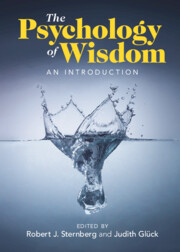Book contents
- The Psychology of Wisdom
- The Psychology of Wisdom
- Copyright page
- Contents
- Figures
- Tables
- Contributors
- Preface
- Part I Introduction to Wisdom Theory and Research
- Part II Foundations of Wisdom in the Individual and in the World
- Chapter 7 Wisdom, Creativity, and Intelligence
- Chapter 8 Wisdom, Morality, and Ethics
- Chapter 9 Wisdom, Personality, and Well-Being
- Chapter 10 The Wisdom in Emotions
- Part III The Modifiability of Wisdom
- Part IV Wisdom in the World
- Index
- References
Chapter 10 - The Wisdom in Emotions
from Part II - Foundations of Wisdom in the Individual and in the World
Published online by Cambridge University Press: 26 May 2022
- The Psychology of Wisdom
- The Psychology of Wisdom
- Copyright page
- Contents
- Figures
- Tables
- Contributors
- Preface
- Part I Introduction to Wisdom Theory and Research
- Part II Foundations of Wisdom in the Individual and in the World
- Chapter 7 Wisdom, Creativity, and Intelligence
- Chapter 8 Wisdom, Morality, and Ethics
- Chapter 9 Wisdom, Personality, and Well-Being
- Chapter 10 The Wisdom in Emotions
- Part III The Modifiability of Wisdom
- Part IV Wisdom in the World
- Index
- References
Summary
As the two definitions of the wise personality, introduced by Ardelt and Webster, highlight, researchers in this tradition agree upon the idea that the wise personality possesses a range of distinct highly desirable traits. At the same time, the two different approaches have focused on slightly different components of the wise personality, making it difficult to draw firm conclusions about its exact nature and structure. Important for present purposes, according to both definitions, wisdom contains cognitive, reflective, and emotional elements. As to the emotional elements, there is consensus that wise individuals are empathic toward others and experience compassion and sympathy in advice giving. In addition, although somewhat implicit in Ardelt’s wisdom model, there seems to be agreement that the wise individual has a comprehensive understanding of emotions and can use emotions in constructive ways. According to Webster, humor is particularly worth noting because it can facilitate bonding, distance from the self, and creativity. Critically, one could note that the theoretical ideas about the emotional traits of wise individuals have remained relatively abstract and vague. For example, from what the authors in this tradition write, it is difficult to understand how the wise personality reacts to concrete emotionally laden events, regulates their own and other people’s emotions, or uses knowledge about emotions in judgment and decision processes or when giving advice to others. In part, this vagueness is due to the trait approach of defining the wise personality and the associated global nature of self-report questionnaires. For example, items such as “If I see people in need, I try to help them one way or another” or “I am good at identifying subtle emotions within myself” assess participants’ beliefs about the degree to which general traits and competencies are typical of them, that is, apply to them in most situations most of the time. Such items do not refer to situation-specific behaviors or states and, thus, do not speak to how people specifically deal with emotionally challenging situations, express and regulate their emotions or use them for advice-giving and decision making processes (see Chapter 6).
Keywords
- Type
- Chapter
- Information
- The Psychology of WisdomAn Introduction, pp. 157 - 172Publisher: Cambridge University PressPrint publication year: 2022
References
- 2
- Cited by



